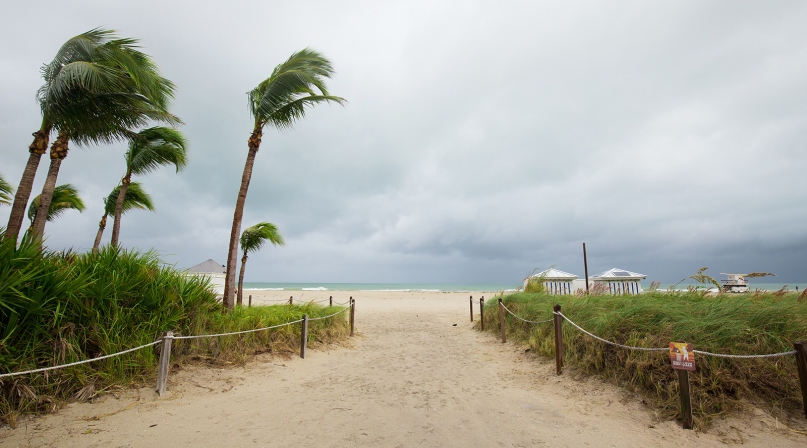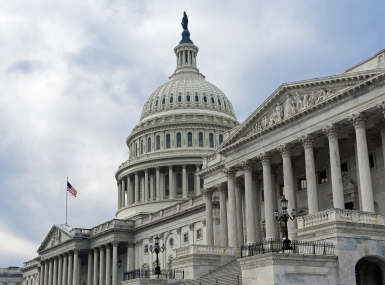Hurricanes & Gratitude

I dictate this article as Hurricane Matthew makes landfall around Central Florida. I live inland in Central Florida but well within the reach of the monster. In fact, as I look out my office window I see that heavy rains have begun.
At times like these, my thoughts return to the repeated times during my several decades as a local government executive when I would kiss my beautiful wife and daughters and bring my backpack to the Emergency Operations Center to be locked up or is it locked down? The lockdown would last until either an all-clear announcement was made, or beyond that, until immediate storm follow-up actions were put into place.
So many times during Florida tropical storms, hurricanes, California earthquakes, huge brushfires and practice exercises, I was shoulder to shoulder with law enforcement and fire rescue command staff: National Guard, health department, public works, utilities and many other agents of local government.
We gathered as much information as we could and made as many decisions as we could. I knew full well that some of the decisions we made, including those for which I was directly responsible — as not only a county and city human resources director but as a county chief administrative officer — would result in my colleagues being dispatched into risky circumstances.
In a time of increasing mistrust of what public safety and public service really involves, the arrival of a major hurricane — the first Category Four hurricane to approach Florida in about a dozen years — should give us great pause and great opportunity to begin practicing the use of words such as “gratitude,” “thank you,” “I’m glad you’re here” and “be safe.”
It is easy to recognize public safety professionals on the street. You can tell by the marked vehicles or the uniforms. Sometimes you can tell by the K9 officers standing next to their handlers. Sometimes you can tell by the public works crews out restoring safe passage on highways or the utility crews working on downed power lines as they work to restore power to thousands of homes.
Many other times, however, you can’t know what really goes into overcoming a monster storm like Hurricane Matthew. That’s because many of the people that make the command decisions or keep the system running don’t wear identifiable uniforms. They include the staff of local government departments such as procurement, human resources, accounting, mental health, building safety and many others.
It is hard to say thank you to unmarked people whose work may save a life or save property or even reduce threats and risks. However, their work nonetheless deserves huge thanks and a much more positive attitude about the importance of local government.
How incredibly lucky we are to live in the U.S.A. with all of the resources available to deal with local, if not regional or statewide, emergencies. Most other places in the world lack these capabilities.
Now that Hurricane Matthew has left behind a trail of horror in places like Haiti and the Bahamas, all we have to do is look at the struggles to respond and survive faced by people there. We are loath to even acknowledge that these circumstances could happen to us.
Complacency is as great a danger to the community as is a monster hurricane. The arrogance to think that we are immune from dangers and catastrophic events leads to failures to act in advance to reduce risks. It leads to the attack of the budget cutters — or at least those among them who will act with overzealous disregard for long-term capacity building. Their attention may be focused on being able to brag about cutting taxes or cutting the number of staff members as they campaign for re-election.
The reality may be, however, that what is really being cut is not the budget but the strategic capability it takes to respond and rebuild. Such short-range thinking — all too prevalent in our world — leads to many other things. It brings about an infrastructure being allowed to slowly erode and rot away, a loss of personal responsibility for personal conduct, spending precious time watching mindless television or video games while charity work and neighborliness suffers. By the way, when did you last have dinner with your neighbor? By the way (again), do we still teach Civics and Civility in K–12 education? Later when the product of more narrow-minded civic malpractice results in poor results or tragedy, many people will be quick to blame others with no notice of their own role in the failures.
As I hunker down, making sure batteries and generators are ready to go if needed, I think of how important it will be in the future to buy lunch for firefighters, police and sheriff’s deputies when I see them at a restaurant, to help them with training or consulting on their behalf, likely leaving behind any HR Doctor’s consulting fees. I will be treating them with a respect and well wishes that should be normal instead of unusual.
These colleagues have a duty to respond to emergencies with efficiency and humanity. They also have a duty to do their jobs with respect and propriety. The huge majority of these public servants do just that even though, as in any profession, there are those who lose brain cells in the face of stress and do the wrong thing. I know from considerable experience that often at the core of such poor behavior is the failure of a dilapidated human resources system.
Nonetheless at the moment the power goes out in my area, which it is quite likely to do, I will make sure that my own personal preparation (including chocolate and wine) and support for my neighbors and family members prevails over villains like Hurricane Matthew.
Please join me in spreading the awareness that none of us stands alone in keeping a society safe, civil and thriving. It is local government that glues these elements together. When we need local government the most, it must be at its best.
Attachments
Related News

Congress introduces Second Chance Act reauthorization
On April 16, the Second Chance Reauthorization Act of 2024 (H.R. 8028) was introduced in the U.S. House of Representatives with robust bipartisan support. NACo supports this legislation, which would reauthorize funding for Second Chance Act (P.L. 110-199) programs for five years.

Congressional leaders introduce new legislation for a national data privacy framework
On April 7, U.S. House Energy and Commerce Committee Chair Cathy McMorris Rodgers (R-Wash.) and U.S. Senate Commerce, Science and Transportation Committee Chair Maria Cantwell (D-Wash.) introduced the American Privacy Rights Act.

U.S. Department of Energy announces $18 million for Local Government Energy Program
U.S. Department of Energy announces $18 million for Local Government Energy Program
